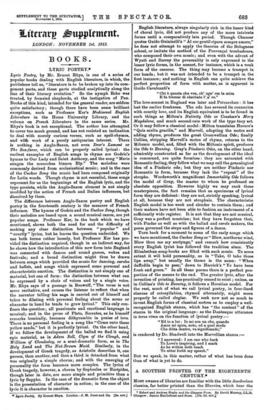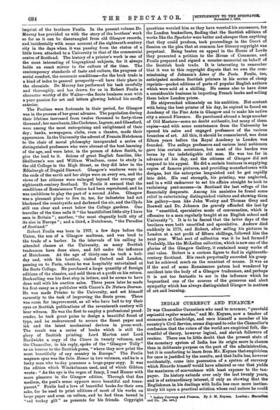• Robert and Andrew Audis and the Glasgow Press. By
David Murray, LL.D. Glasgow : James MaeLebose and Sons. 1108. 60. net.]
imprint of the brothers Foulis. In the present volume Dr. Murray has provided us with the story of the brothers' work so far as it can be disentangled from old Glasgow records, and incidentally with some account of the eighteenth-century city in the days when it was passing from the status of a little town attached to a University to that of the commercial centre of Scotland. The history of a printer's work is one of the most interesting of biographical subjects, for it always holds an exact mirror to the culture of the time. The contemporary standards of taste and culture, the progress of social comfort, the economic conditions—for the book trade is a kind of index to general prosperity—all have their place in the chronicle. Dr. Murray has performed his task carefully and thoroughly, and has drawn for us in Robert Foulis a
character worthy of Sir Walter—the Scots business man with a pure passion for art and letters glowing behind his snuffy exterior.
The Foulises were fortunate in their period, for Glasgow was in the process of her great advance. The population during their lifetime increased from twelve thousand to forty-three thousand ; ber merchants, like Cochrane, Ingram, and Glassford, were among the most enterprising and enlightened of their day ; banks, newspapers, clubs, even a theatre, made their appearance. lathe University the advent of Francis Hutcheson to the chair of moral philosophy inaugurated a series of distinguished professors who were abreast of the best learning of the age, and were later, in the person of Adam Smith, to give the lead to it. Scions of great English families, like Shelbunae's son and William Windham, came to study in the old College in the High Street, as they did later in the Edinburgh of Dugald Stewart. Glasgow's ventures were in the ends of the earth and her ships were on every sea, and the views of her citizens were enlarged beyond the average of eighteenth-century Scotland. To Foulis it seemed that the conditions of Renaissance Venice bad been reproduced, and he was ambitious to play the part of a second Aldus. Glasgow was a pleasant place to live in, too, for industries had not blackened the countryside and darkened the air, and the Clyde still ran clear and sweet below the College gardens. One traveller of the time calls it "the beautifullest little city I have seen in Britain "; another, "the most elegantly built city of its size in Europe "; and a third, a Dutchman, "the Paradise of Scotland."
Robert Foulis was born in 1707, a few days before the Union, the son of a Glasgow maltman, and was bred to the trade of a barber. In the intervals of his calling he attended classes at the University, as many Scottish tradesmen have done since, and fell under the influence of Hutcheson. At the age of thirty-one he took a holi- day and, with his brother, visited Oxford and London, passing on to Paris, where he was hospitably entertained at the Scots College. He purchased a large quantity of foreign editions of the classics, and sold them at a profit on his return. Bookselling was his first step in letters, and he seems to have done well with his auction sales. Three years later be made his first essay as a publisher with Cicero's De Natura Deorum. He was made Printer to the University, and set himself earnestly to the task of improving the Scots press. There was room for improvement, as all who have had to try their eyes on Scottish publications of the seventeenth century will bear witness. He was the first to employ a professional proof- reader, be took great pains to design a beautiful fount of type, and be endeavoured to secure the finest paper and ink and the latest mechanical devices in press-work. The result was a series of books which is still the glory of Scottish printing. Lord Morton sent Lord Hardwicke a copy of the Cicero in twenty volumes, and the Chancellor, in his reply, spoke of the "Glasgow Tully" as an honour to the Scottish press, "where they now print the most beautifully of any country in Europe." The Faiths magnum opus was the folio Romer in two volumes, and he is a lucky man who to-day possesses a large-paper copy. It was the edition which Winckelmann used, and of which Gibbon wrote : "As the eye is the organ of fancy, I read Homer with more pleasure in the Glasgow edition. Through that fine medium, the poet's sense appears more beautiful and trans- parent." Foulis had a love of beautiful books for their own sake, for be used to print editions of most of his works on large paper and even on vellum, and be had them bound in • Indian Currency and Finance. "ied turkey gilt" as presents for his friends. Copyright and Co. [6s. net.] questions worried him as they have worried his successors, for the London booksellers, finding that the Scottish editions of works like the Spectator were better and cheaper than anything that they could produce, took proceedings in the Court of Session on the plea that at common law literary copyright was perpetual. Being beaten on appeal in the House of Lords they presented a petition to the House of Commons, and Foulis prepared and signed a counter-memorial on behalf of the Scottish book trade. It is interesting to remember that it was to this copyright dispute that we owe the com- missioning of Johnson's Lives of the Poets. Foulis, too, anticipated modern Scottish printers in his series of cheap reprints—pocket editions of parts of popular English authors which were sold at a shilling. He seems also to have done a considerable business in importing French books and selling them below London prices.
He shipwrecked ultimately on his ambition. Not content with being the best printer of his day, he aspired to found an Academy of the Fine Arts in Glasgow and to make his native city a second Florence. He purchased abroad a large number of Old Masters—some no doubt authentic, but many of them copies—and with some countenance from the University he opened his salon and engaged professors of the various branches of art. All this, it should be remembered, was done fifteen years before the Royal Academy in London was founded. The college professors and various local noblemen gave him certain assistance, but most of the burden was borne by the indefatigable old man. He was too far in advance of his day, and the citizens of Glasgow did not respond to his appeal. He did a certain business in supplying copies of famous pictures, and providing manufacturers with designs, but the enterprise languished and he got rapidly into debt. His real strength, his printing, was neglected, and in a wild endeavour to set his affairs straight he took to reclaiming peat-mosses—in Scotland the last refuge of the financially desperate. Among his anxieties be found some relief in entertaining distinguished visitors and showing theni his gallery—men like John Wesley and Thomas Gray and Boswell and Dr. Johnson (he gravely offended the last by his "unsettled, speculative mode of conversation, which is offensive to a man regularly taught at an English school and University "). It is to be feared that the latter days of the brothers were both unsettled and speculative. Andrew died suddenly in 1775, and Robert, after selling his pictures in London at a net profit of fifteen shillings, followed him the next year. What sort of collection was it he had formed ? Probably, like the McLellan collection, which is now one of the glories of the Glasgow Gallery, it contained many works of real value. Robert is a curious figure to find in eighteenth.. century Scotland. His reach perpetually exceeded his grasp but he achieved much on the scantiest of means. It was as if the soul of some Renaissance patron had wandered by accident into the body of a Glasgow tradesman, and perhaps it is not too fantastic to see in the influence which he
bequeathed one of the sources of the generous and alert sympathy which has always distinguished Glasgow in matters of art and learning.































































 Previous page
Previous page